Cultural Significance of Aftari Time in Dubai
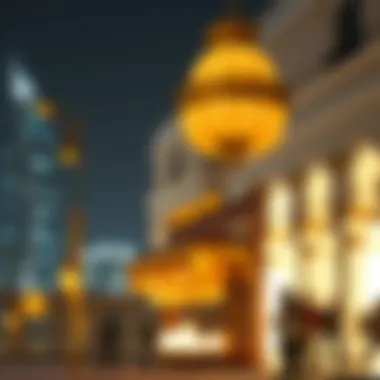
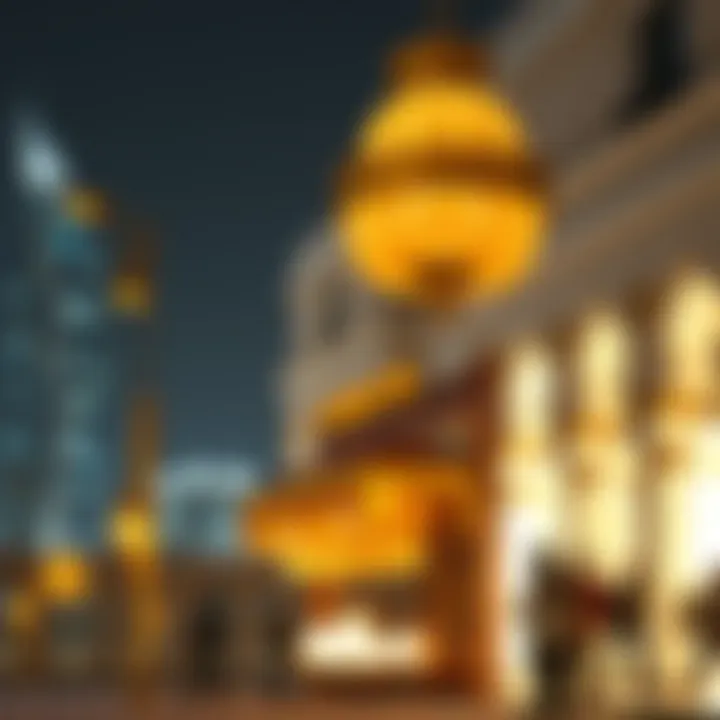
Intro
In Dubai, as the sun sinks below the skyline, the city undergoes a remarkable transformation. The bustle of daily life pauses momentarily, replaced by a profound cultural practice that resonates deeply with its diverse population—Aftari time. This ritual, marking the daily breaking of fast during the holy month of Ramadan, is not just about quenching hunger or thirst; it is a celebration of community, spirituality, and tradition that binds residents together.
As the call to prayer echoes, families and friends gather around tables laden with a feast of culinary delights. The aroma of dates, savory soups, and spiced dishes wafts through the air, beckoning all to partake in the meal that ushers in the evening. Aftari represents much more than a meal; it is a moment of togetherness, reflecting the generous spirit that characterizes Dubai's culture.
Delving into the significance of Aftari time reveals intricacies that influence daily interactions and foster community bonds. Exploring this cultural milestone provides insights into how Ramadan shapes lifestyles, highlights culinary artistry, and infuses a sense of shared identity among residents in this modern metropolis.
The ensuing sections will unfurl the customs and practices entwined with Aftari, showcasing how this sacred time cultivates social connections while illustrating the balance between modern living and rich traditions that Dubai so beautifully embodies.
Cultural Importance of Ramadan
Ramadan holds immense cultural significance for Muslims, especially in a cosmopolitan city like Dubai. It is a month where the focus shifts from daily bustle to spiritual rejuvenation and community cohesion. As the sun sets and Aftari time approaches, families come together to break their fasts, symbolizing not just the end of a day of abstinence but also a re-connection with family, friends, and the wider community. The customs and practices surrounding this period enrich the social fabric of society, ensuring that traditions are passed down while adapting to contemporary lifestyles.
The Spiritual Significance
The essence of Ramadan rests on the spiritual growth it fosters among Muslims. It is not merely about refraining from food or drink; it's about cultivating self-discipline, empathy, and reflection. During this month, one seeks to commune with their spirituality, engaging in daily prayers and reciting the Quran. Many take this time to reflect on their actions, seek forgiveness, and renew their commitment to their faith. It’s elusive to those who haven’t experienced it, yet as one delves deeply, they find a form of clarity and connection that transcends the mundane.
Community Unity and Social Bonds
Amidst the revelry and fast-breaking meals, Ramadan serves as a catalyst for fostering social bonds. It is a time when neighbors, friends, and families gather to share meals, often inviting others outside their immediate circle. This creates an openness, a camaraderie which is often rare in the fast-paced life that so many lead. The act of breaking fast together—often with traditional dates and water—highlights the commonality of experience, regardless of one’s background.
- Sharing meals becomes a universal language transcending barriers, an opportunity for dialogue and understanding.
- Community iftars, where large groups gather for communal meals, emphasize generosity and hospitality, echoing the teachings of Islam.
- Charitable acts proliferate as many opt to give back, feeding the less fortunate, thereby reinforcing collective responsibility and care.
As residents of Dubai partake in these rich cultural traditions, they not only adhere to religious obligations but also strengthen the bonds that bind them together, reflecting a microcosm of global solidarity within a localized setting.
Defining Aftari Time
Aftari time holds immense significance during Ramadan in Dubai. It marks the moment when observers break their fast, transitioning from a day of abstaining from food and drink to a celebration of community and spirit. Understanding this period goes beyond just the act of eating; it connects the larger cultural and spiritual practices inherent to this holy month. Exploring Aftari can illuminate the ways it fosters communal ties and fosters a sense of belonging among diverse populations.
What Constitutes Aftari
Aftari is more than simply breaking one's fast; it is a ritual steeped in customs and shared experiences. Many families begin with dates and water, adhering to a long-standing tradition said to be revered by the Prophet Muhammad. The dates symbolize sweetness after a day of fasting. Other traditional elements often found on an Aftari table include lentil soup, a variety of salads, and aromatic rice dishes. The spread not only reflects cultural heritage but also the generosity that characterizes eager hosts eager to share with friends and family.
In many households, each dish tells a story. Take, for instance, Biryani, a fragrant rice dish enriched with spices and delicious meats; it’s often the centerpiece during Aftari gatherings. This culinary gem speaks volumes about the fusion of traditional and modern influences present in Dubai's evolving food landscape.
Timing: When Aftari Occurs
Aftari takes place at sunset, aligning with the call to prayer that signals the end of the daily fast. Specific timings can vary depending on the location; in Dubai, people are attuned to the local timings based on the Islamic calendar, which shifts slightly each year. Residents often rely on local mosques or Islamic apps that provide accurate times.
Interestingly, the anticipation of Aftari can be felt throughout the day. Street vendors start preparing delicacies and families gather, all eagerly waiting for the moment they can break their fast. When sunset arrives, there is a collective sense of gratitude and relief as families, friends, and neighbors come together. This moment is often marked by heartfelt prayers and expressions of gratitude, which enhances the sense of community during Ramadan.
"Aftari transcends the act of eating; it weaves together various threads of culture, tradition, and community spirit."
Culinary Treasures of Aftari
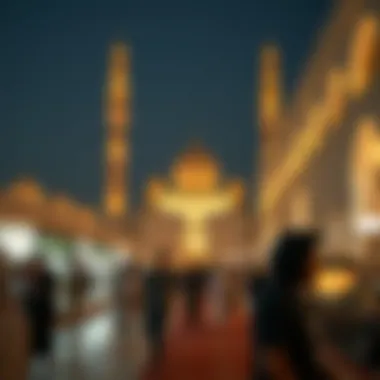
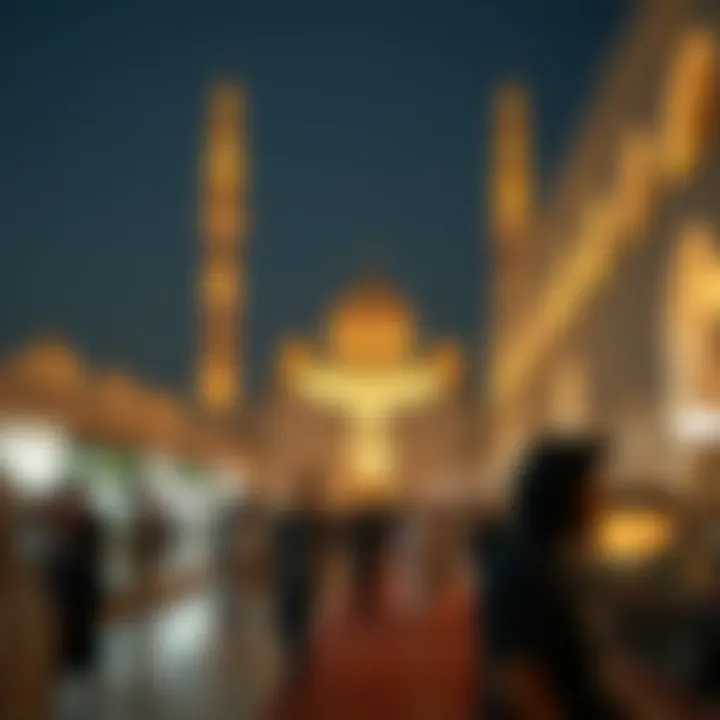
Aftari time in Dubai is not just a moment to break the fast, but a celebration of culinary heritage and community. During Ramadan, the relationship between food and culture becomes incredibly vibrant, with tables laden with dishes that embody the spirit of togetherness. It’s also a time when people reflect on the significance of what they eat, often taking a moment to express gratitude. The culinary treasures of Aftari serve not only to nourish the body after a long day of fasting but also weave bonds among family and friends. In this section, we'll delve into the glory of traditional dishes, the pivotal roles of dates and water, and how modern twists have added a new flavor to this cherished practice.
Traditional Dishes and Beverages
Every region has its own specialties, and Dubai is no exception. Traditionally, the Aftari spread includes an array of savory and sweet dishes. From samosas to foul medames, these diverse flavors excite the palate. It's like walking through a festival of tastes that reflect both local traditions and the myriad cultures that call Dubai home.
A favorite is shorbat adas, a comforting lentil soup, often enriched with spices that warm you to the core. Another staple is harees, made from wheat and meat, which reflects the communal sharing aspect of Aftari. Families whip up these dishes together, creating not just food, but memories.
Beverages, too, hold importance during Aftari. Qamar al-Din, an apricot drink, is immensely popular. The sweet tartness signals the break of fast, while its refreshing quality rejuvenates those who have gone hours without water. Preparations like these encourage sharing and foster a sense of community around the dining table.
The Role of Dates and Water
Dates and water are iconic at Aftari, serving as the first items consumed as the sun sets. The Prophet Muhammad is reported to have broken his fast with dates, and this tradition continues today. Not only are dates packed with nutrients, but they provide an immediate source of energy to kickstart the body after a day of fasting.
Water, simply put, is essential after hours without intake. It's no wonder that homes stock up on ample supplies of water during Ramadan. It’s almost a ritual—breaking the fast with three dates and a glass of water brings a welcome relief.
This simple act lays the foundation for a more elaborate meal to follow, highlighting not just sustenance but a deep sense of gratitude.
Modern Twists on Aftari Foods
In today’s cosmopolitan Dubai, modern influences are visible in Aftari menus. Traditional dishes have evolved, sometimes infused with flavors from other cultures. For example, one might find biryani arancini, a fusion of Italian and Emirati cuisine.
Additionally, health-conscious individuals may adapt sweets by replacing sugar with natural alternatives, providing a guilt-free indulgence in beloved classics like kunafa. These changes reflect an ongoing dialogue between the past and the present, showing how traditions can adapt without losing their essence.
Social media also plays a role—hashtags like #AftariCreations trend during the month, as people share their own culinary experiments. When individuals gather to eat, they aren’t just enjoying a meal; they are partaking in a cultural exchange that embraces both heritage and innovation.
Furthermore, restaurants around Dubai have embraced the spirit of Aftari by offering special menus that showcase contemporary twists on traditional favorites, allowing all to experience the richness of the local cuisine without straying too far from its core identity.
It’s a blend of respect for history while also setting the table for what’s to come—a culinary journey that serves as a metaphor for Aftari itself.
Aftari Across Different Communities
Aftari time in Dubai is not just a meal; it's a vivid tapestry woven with the threads of diverse cultures. Each community contributes its unique flavors, customs, and practices to this important event during Ramadan. Understanding the variations of Aftari across different communities helps illuminate the rich cultural dynamics of Dubai, showcasing how different groups celebrate unity while maintaining their individuality.
Variations Among Emirati Families
Among Emirati families, Aftari is often a gathering of generations under one roof. It serves as a stage to celebrate both religious observance and familial ties. Traditionally, the meal includes local dishes like haris, majboos, and na’ama. These dishes are prepared with care, and often reflect family recipes passed down through generations.
Many Emirati households start their Aftari ritual with the breaking of the fast using three dates and a glass of water. Following this is usually a casual gathering, with family members sharing stories while enjoying a feast around the dining table. The atmosphere is filled with warmth and the aroma of spices, provoking nostalgia and a sense of belonging.
With the momentum of modernity, it is also common for Emirati families to incorporate global dishes into their Aftari spread, such as sushi or pizza, signifying an openness to new experiences while still holding onto cherished traditions.
- "Every meal reminds us of home, of our roots, and of those who came before us."
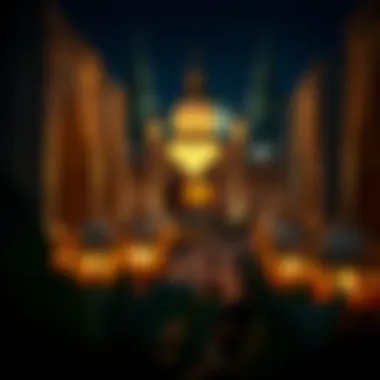
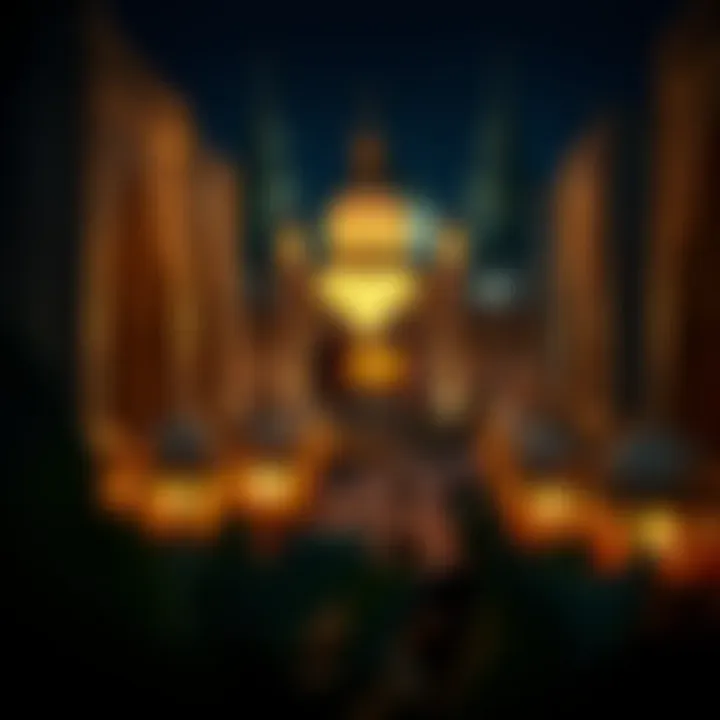
Aftari thus becomes a bridge connecting the past with the present, reinforcing the significance of familial bonds during a time of reflection.
Influences from Expatriate Cultures
Expats in Dubai bring their culinary heritage to Aftari, enriching the local tradition with new flavors and customs. From Asian dishes to Western favorites, the fusion of cultures during Aftari reflects Dubai's melting pot nature. It's common to see Asian delicacies, such as dim sum or pho, making their way into various dinner tables alongside traditional dishes.
Many expatriate communities make Aftari a potluck affair, where a diverse menu displays a blend of every culture's offerings. This practice helps to forge bonds among different nationalities, as they gather to share meals and stories, often in multi-generational setups similar to Emirati households.
Social media amplifies this culinary exchange, with expats showcasing their distinctive Aftari dishes on platforms like Instagram and Facebook. This sharing creates a new tradition where cultural pride enhances the collective experience of breaking the fast.
In these gatherings, one can observe a seamless mix of traditional Emirati greetings and farewells, creating a cheerful atmosphere that emphasizes inclusivity and togetherness.
Social Dynamics During Aftari
Aftari time in Dubai is not just about breaking the fast; it is a vital period that strengthens social ties and reflects the community's spirit during Ramadan. Understanding the social dynamics at play helps underscore how these gatherings are far more than mere meals. They represent a focal point for family togetherness, communal solidarity, and even charitable engagement. In a city as diverse as Dubai, where cultures intersect, Aftari becomes a microcosm of the broader societal fabric, fostering connections through shared experiences and mutual respect.
Gatherings and Family Traditions
Family gatherings during Aftari often take on a special significance. The moment the sun sets, homes become hubs of activity as families gather around tables laden with traditional dishes. This is not merely the breaking of a fast; it’s a ritual steeped in shared history and the reinforcement of familial bonds. Many families have their unique traditions that they pass down through generations.
- Creating New Memories: From preparing dishes together to reciting prayers before the meal, these moments create lasting memories. Children learn the importance of family values, instilling a sense of belonging and identity as they participate in rituals that have stood the test of time.
- Culinary Contributions: Family members often contribute their specialties, resulting in a potluck-style feast where each dish tells a story, showcasing different family traditions and regional influences. The aromas wafting through the house during Aftari truly elevate the experience, solidifying its importance as a gathering time.
“It’s not just food; it’s love served on a platter,” an Emirati once said, aptly capturing the essence of Aftari meals that go beyond sustenance.
Community Events and Charitable Acts
The spirit of Aftari also extends to community events, where organizations and individuals join forces to ensure everyone has a meal during Ramadan. Though Ramadan is often viewed from a personal lens of devotion, it’s equally marked by community efforts to support the less fortunate.
- Charitable Initiatives: Many businesses and mosques organize events where they provide free meals to community members. This act of giving is a vital aspect of Ramadan’s teachings, exemplifying the importance of generosity during this holy month.
- Public Aftari Gatherings: Parks and community centers often host large public Aftari events. These gatherings reflect the diverse tapestry of Dubai, where people from various backgrounds come together to break bread, contributing to a sense of unity and shared purpose.
In Dubai, where the pace of life can often feel rushed, Aftari serves as a significant moment to pause, reflect, and reconnect with one another. Through these gatherings and charitable activities, the collective experience of Aftari enhances the social fabric of the community, reminding everyone of the values that bind them together beyond individual differences.
For more information about communal activities during Ramadan, you can visit Britannica or check out community resources on Reddit.
Aftari brings people together, reminding us all that at the heart of our differences lies a common humanity.
As the sun sets each day during Ramadan, Aftari embodies a rich cultural exchange that nurtures familial love and community spirit—a true testament to the values deeply ingrained in Dubai’s society.
The Role of Aftari in Business
Aftari time is not just about breaking fast; it holds a wealth of opportunities for the business community in Dubai. The cultural context of Ramadan transforms Aftari into a unique setting for networking and building relationships. As companies look to strengthen their ties with clients and partners, the evenings of Ramadan become a prime window to do so.
Networking Opportunities in Aftari Gatherings
During Aftari, the atmosphere is welcoming and full of warmth. Businesses can utilize this time to connect with stakeholders in a more personal setting.
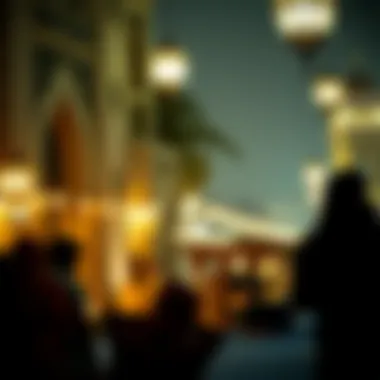
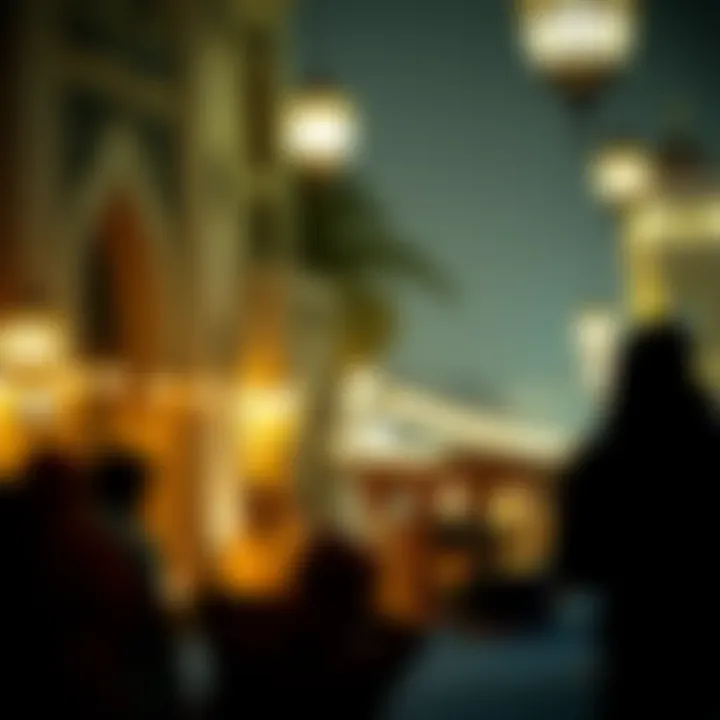
- Informal Setting: Unlike formal meetings in a conference room, Aftari gatherings provide a relaxed environment. This casual setting encourages open conversation and facilitates deeper connections.
- Shared Experience: Breaking bread together creates a bond that is often missing in other business interactions. Sharing traditional dishes fosters camaraderie and mutual understanding among participants.
- Diverse Guest Lists: Aftari gatherings often include a mix of professionals from various backgrounds—local and expatriate alike. This diversity opens doors for new contacts and collaborations that may not arise in regular business settings.
Moreover, these gatherings are set against the backdrop of rich cultural traditions, making it easy to engage in discussions about shared values and common goals. As one might say, it’s a golden opportunity to rub shoulders with those who matter.
Promotions and Marketing Strategies
Companies can leverage Aftari time for creative marketing strategies. It’s a chance to engage clients through promotions that resonate with the spirit of Ramadan. Here’s how:
- Tailored Campaigns: Businesses can roll out Ramadan-specific products or campaigns that resonate with values of community and generosity. For instance, local restaurants may offer special Aftari deals or meal packages that are designed with family gatherings in mind.
- Sponsorships: Brands can consider sponsoring Aftari events or community gatherings. By aligning with cultural festivities, they can enhance visibility and build goodwill among the community, which often translates to loyal customers.
- Social Media Engagement: With the rise of digital influence, companies can use social media platforms to promote their Aftari offerings. Posting visually appealing content about special dishes or community involvement can lead to increased engagement, especially when paired with hashtag campaigns that capture the essence of Ramadan.
Aftari in the Era of Modernity
As the sands of time shift, so too does the way Aftari is celebrated in Dubai. The blend of traditional customs and modern influences showcases an evolving cultural landscape. In a city where skyscrapers pierce the cloud cover, and innovation is just as common as the call to prayer, Aftari has begun to reflect not only the spiritual awakenings during Ramadan but the vibrant pace of contemporary life. Understanding Aftari in this modern era means recognizing how technology transforms lives while still honoring the sacred.
Digital Influences on Aftari Celebrations
With the digital age firmly in place, the landscape of Aftari has been colored by social media platforms and technological innovations. Many people now share their Aftari experiences online, posting pictures of meals, expressing gratitude, and joining virtual gatherings. This digital shift enables families and friends separated by distance to connect and participate in Aftari together, despite physical barriers.
- Social Sharing: Platforms like Instagram and Facebook have created a visual diary of Aftari experiences, encouraging others to share their table settings or favorite dishes.
- Community Engagement: Online forums and groups allow individuals to exchange recipes or tips for the best local places to break fast. This sense of community enhances the shared experience of Ramadan, strengthening bonds beyond physical gatherings.
Moreover, numerous apps now cater to the needs of those observing Ramadan, offering prayer times, recipes, and reminders for Aftari. In a bustling city like Dubai, such tools streamline the experience for busy professionals and families, integrating tradition with technology in a seamless manner.
Culinary Innovation through Technology
The realm of Aftari is not just limited to the scents and sights of traditional dishes. Modern culinary techniques and technology are breathing new life into age-old recipes. With chefs embracing advancements like sous-vide cooking and molecular gastronomy, Aftari tables are refreshing and full of surprises.
- Fusion Flavors: Traditional dishes are experiencing a creative twist. For instance, classics like Harees or Nihari might find themselves served with a side of avocado salsa or even elevated through innovative cooking methods that enhance flavors.
- Health-Focused Options: In parallel, there is an increasing consideration for health-conscious diners. Many establishments are offering gluten-free or vegan Aftari dishes, allowing a wider audience to enjoy the meal without compromising their dietary preferences.
Bringing in smart technology, home cooks might turn to gadgets such as air fryers or instant pots, making it easier to whip up traditional meals in less time. Through food delivery apps, the food landscape is changing, allowing people to access their favorite Aftari dishes from various restaurants throughout the city, thus flavors becoming more accessible than ever.
In summary, Aftari in the modern context showcases a fascinating transformation within Dubai's social fabric. It is a unique tapestry of tradition and modernity, where families gather not just around the food but also around shared experiences enhanced by technology. All while maintaining the essence of what Aftari truly represents.
Culmination: Embracing Tradition in a Modern Context
Aftari, the moment of breaking fast, holds a significant space in the cultural tapestry of Dubai, especially during Ramadan. The evening ritual transcends mere nourishment; it embodies a convergence of tradition, community, and modernity. Understanding Aftari time is pivotal not just for recognizing the practices surrounding Ramadan, but for grasping how these traditions influence social fabric and identity.
Reflecting on Cultural Identity
The essence of Aftari time speaks volumes about cultural identity in Dubai. It's during these moments that families gather around tables, sharing stories, laughter, and food. Each dish served is a testament to history—a nod to the past, while also linking generations, creating a rich narrative that fosters belonging.
For many, the act of breaking fast is akin to physically and spiritually reconnecting with their roots. It reminds them of their upbringing, their family's culinary legacies, and how these elements have woven into the fabric of their daily lives.
Aftari time, thus, stands as a reflection of resilience, reminding the community of its customs amidst rapid globalization. As Dubai continues to modernize and attract diverse cultures, it's the Aftari traditions that provide a grounding point, ensuring that heritage doesn't fade away in the face of change.
Looking Forward: The Future of Aftari
As we gaze into the future, it is intriguing to consider how Aftari practices may evolve while still holding onto their core traditions. The infusion of technology plays a crucial role—photos of elaborate Iftar spreads shared on social media platforms not only promote community spirit but also inspire culinary experimentation.
Restaurants now frequently introduce innovative Aftari menus that reflect global cuisines while honoring local flavors. Expat communities, too, bring their culinary traditions into the mix, resulting in an exciting fusion that could redefine the concept of breaking fast.
Moreover, as Dubai continues to attract attention on a global scale, Aftari could become an event that encapsulates the city's culinary tourism. In future, food festivals embracing the diversity of Aftari might be commonplace, drawing both locals and international visitors to experience these vibrant gatherings.
Aftari time merges the past with the present, allowing individuals to celebrate their cultural identity while embracing modern influences.







